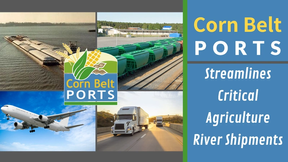Fire Suspends Sugar Loading at Tiplam Terminal in Brazil's Santos Port
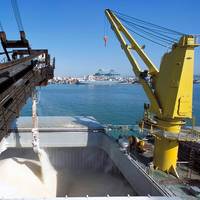
A fire that destroyed a conveyor belt and electric systems at the Tiplam terminal in the port of Santos, Brazil's largest, caused a suspension of sugar loading on piers 2 and 3 on that terminal, according to a note from the company.The fire broke out on Thursday night on the site and was controlled on Friday morning. There were no victims, but the destruction of the conveyor belt stopped loadings in the berths, said the note to clients of VLI, the company managing the terminal.
Shiploader Collapses at Brazil's Recife Port
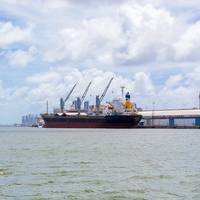
An accident with a shiploader at the sugar terminal in the Recife port in Northeastern Brazil suspended loading operations at the site, according to a note from shipping company Williams Brazil late on Thursday.The company said the shiploader collapsed and a part of the machine fell inside the cargo hold of a vessel that was docked at the port to load raw sugar.The press service at the Recife port confirmed the accident, adding that nobody was hurt.The port said experts are evaluating the situation and there is still no time frame for the repair.
War, Weather Put Ocean Shippers on Notice for Rough Seas in 2024
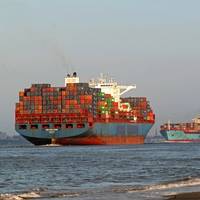
Recent hostilities in the Red Sea have thrown global shippers of vital goods for a loop - but it is hardly the only issue that big carriers are facing as 2024 kicks off.Giants like Maersk say the industry, which handles 90% of global trade, faces the possibility of significant disruptions, from ongoing wars to droughts affecting key routes like the Panama Canal. Complex vessel schedules are likely to be knocked out of sync for giant container ships, fuel tankers and other commodity haulers throughout the year.That will increase delays and raise costs for retailers like Walmart…
It's Crunch Time for Brazilian Ports

Brazil’s commodities export hubs are strained with record volumes of soy, corn and sugar to be moved at a time of the year when rains start to increase in southern ports, according to traders, analysts and shipping data.Exporters are reporting delays in coffee shipments due to a tight availability of trucks and containers, while loading waiting times for vessels have jumped, resulting in additional costs for traders and delays for the commodities to reach destinations.Brazil ports have been dealing with high volumes this year…
Rush of Brazilian Sugar Cargoes Unusually Heads to Russia
At least five vessels are headed toward Russia with nearly 200,000 tonnes of Brazilian raw sugar sold by European traders, according to shipping data seen by Reuters, about double the country's normal annual imports of the sweetener.Sanctions following Russia's invasion of Ukraine have boosted demand for sugar and other food staples there, and store shelves have been emptying due to food hoarding. Yet sanctions may also make it harder for shippers to get paid for their cargoes.The volume of sugar being shipped is unusually high, traders said, noting Russia tends to import roughly 100,000 tonnes of sugar per year. Russia is not a notable importer or exporter of sugar…
'Containergeddon' Drives Sugar, Rice Shippers Back to Bulk Carriers
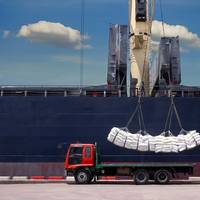
Food traders are switching from containers back to dry bulk vessels to transport refined sugar and rice, hoping to avoid shipping delays caused by container shortages and port congestion that the industry is calling "containergeddon", according to traders.Container-based transportation has been hit by sky-high costs and delays amid booming shipping demand, while container terminals at ports struggle to deal with the flow.Commodities such as refined sugar, coffee, rice, cotton…
Congestion at Brazil's Largest Port Leaves Traders Scrambling
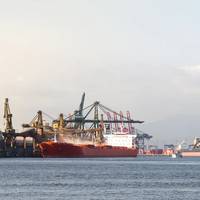
Soy and sugar traders are fighting for room in Latin America’s largest port, rushing to secure loading slots as the slowest Brazilian soy harvest in 10 years pushes the grains export window into the sugar season.Congestion was hitting Brazil’s Santos port just as consumers worldwide have been turning to top exporter Brazil for sugar and soybean supplies. The glut of shipments waiting to leave is boosting transport costs and will likely delay arrivals at destinations.Sugar prices hit a four-year high late last month, boosted by supply tightness.
Container Shortage Delays Shipments of Brazil's Record Coffee Crop
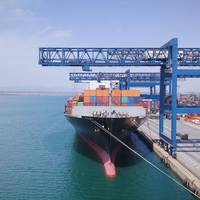
Coffee traders are struggling to ship cargos out of Brazilian ports because of a shortage of available containers or space in vessels to hold them, according to traders and analysts.Brazil's economy is suffering due to the coronavirus pandemic, causing a 40% slide in its currency, the real. That spurred a flood of exports of now-cheaper goods, but imports have dropped sharply, causing the imbalance in containers that has led to delays.That's a direct hit to Brazil, which with…
Sugar Shipping Rush Causes Huge Vessel Logjam in Brazil
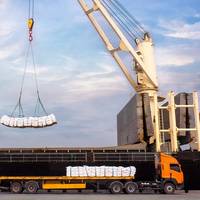
More than 70 ships are lined up at Brazil's port of Santos to load sugar for export in a queue that may take a month to clear after buyers worldwide scrambled to get ahead of possible disruption caused by the ravages of the coronavirus pandemic.A large share of the global sugar trade turned to Brazil, which posted record output, and after poor harvests in India and Thailand. The South American nation now has, however, the second-most COVID-19 cases worldwide at more than 610,000.Three bulk carriers had loading operations suspended in recent weeks and faced a 14-day quarantine in Santos…
Loading Resumes at Brazil Port After Ship Quarantined
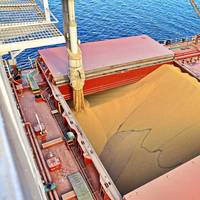
Soybean loading operations were set to resume late on Tuesday at a berth at Brazil's Paranaguá port after a ship was ordered into quarantine following a positive COVID-19 test on a crew member, authorities said.Loading at the berth was halted after the positive test, the Williams shipping agency said, adding that it was the first confirmed case of the disease at the port since the coronavirus outbreak began.All other berths at the port continued to operate as normal.Brazil's health surveillance agency ANVISA later authorized the ship to leave berth 214 after all other crew members were tested,
Brazilian Beaches Hit by Second Oil Spill

Crude oil smudges have been spotted at some Brazilian beaches in the northeast state of Ceará, the country's navy said on Monday, almost two months after the area was hit by another oil slick.That was part of a broader spill, whose origin remains a mystery, that stained hundreds of beaches on Brazil's northeast coast between September and November, threatening marine life, tourism and fishing.The navy said samples of the new spill were being sent for analysis to a marine studies institute…
Iran Grain Ships Stranded in Brazil due to U.S. Sanctions
Two Iranian vessels have been stranded for weeks at Brazilian ports, unable to head back to Iran due to lack of fuel, which state-run oil firm Petrobras refuses to sell them due to sanctions imposed by the United States.The vessels Bavand and Termeh came to Brazil a couple months ago carrying urea, a petrochemical product used as fertilizer. They were expected to load corn and return to Iran, but lacked enough fuel for the trip, the port operator in Paranaguá told Reuters.Food is not covered by U.S. sanctions, and Iran is one of the largest buyers of Brazil's agricultural commodities, importing more than 2.5 million tonnes of Brazilian corn so far this year — more than any other country.However, that trade is not usually carried by ships flying the Iranian flag.
Container Overbooking Causing Delays for Brazil Exports -Maersk
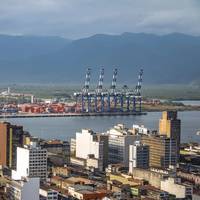
Brazilian exporters are facing delays shipping goods transported in containers, including coffee and cotton, due to overbooking, the world's largest container shipping company, A.P. Moller-Maersk A/S, said on Monday.In a report on its operations in Brazil, Maersk said exports fell for the second quarter in a row, citing the practice of some exporters reserving more space in ships than they need, leaving other companies failing to find room for their cargo."Exporters are hurting each other when they book space they end up not using…
Coffee Exporters Struggle to Find Ships for Brazil Bumper Crop
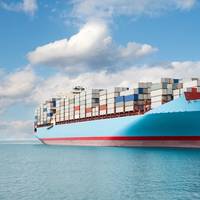
Brazilian coffee exporters are struggling to find shipping capacity to transport a bumper crop from the world's top producer, which could result in supply delays to roasters worldwide.Abundant overall supplies in consuming countries, however, will limit any near-term impact from shipping delays of Brazil's new crop and are not yet seen impacting coffee prices that are 12-year lows.Farmers in Brazil are finishing what the government and industry expect to amount to a record coffee…
Number of Ships Waiting to Load Soy in Brazil Jumps 60%

The number of ships waiting to berth at Brazilian ports to load soybeans and its byproducts is currently almost 60 percent larger than in the same period last year, according to data from shipping agency Williams compiled by Reuters.At the same time, the amount of ships that are berthed and currently loading is 42 percent smaller than seen at this time last year.Associations representing soy processors and grain exporters said the situation is caused by slower transportation of grains from producing regions to the ports…
Brazil Vessel Lineup for Sugar 60% Behind 2017
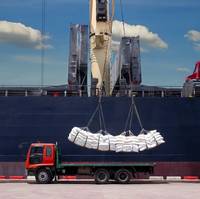
The lineup of vessels to load sugar in Brazil currently is around 60 percent smaller than seen in the same period a year earlier because of lower output and tepid foreign demand, midway through the first month of the country's new cane crop. Ten vessels were at Brazilian ports in the first week of April to load 393,500 tonnes of sugar, according to data from shipping agency Williams. At this time last year, 23 ships were at port to take on 950,400 tonnes. "The main reason for that is the smaller production in Brazil…
CSN Iron Ore Terminal Not Operating after Accident
The loading of iron ore at Brazil's Itaguaí terminal operated by mining and steel firm Companhia Siderúrgica Nacional, or CSN, have been halted since Saturday due to an accident, sources and the Itaguaí Port Authority told Reuters on Wednesday. Some Capesize bulk carriers that were waiting to load iron ore at the terminal are being put back into the charter market, said a German shipping source, due to the impossibility to load the product in Brazil. CSN confirmed the accident, but had no immediate information regarding Itaguaí operations. (Reporting by Alberto Alerigi Jr and Gustavo Bonato; Additional reporting by Michael Hogan; Writing by Marcelo Teixeira)
Vale Sells Two Large Ore Carriers for $178 Mln
Brazilian mining company Vale SA on Wednesday said it has sold two ships with a capacity to carry 400,000 tonnes of iron ore each for a total of $178 million. The company said it received the payment on August 8 and that it is in talks to sell two remaining ships of the same class (VLOC, very large ore carriers). Vale did not reveal the name of the buying company. (Reporting by Marcelo Teixeira; editing by Diane Craft)
Brazil's 20% Ethanol Import Tax Rule Takes Effect
New rules governing Brazil's ethanol imports, which slap a 20 percent penalty for volumes above a tax-free import quota, took effect on Friday, authorities said. Brazil's foreign trade chamber Camex said in an official written resolution that the rules will be valid for two years. It is the first time that Brazil has taxed ethanol imports, with the government reversing its position of avoiding taxes on the biofuel's trade, following complaints from local producers about rising imports. The government had opposed an import tax so as to encourage use of the biofuel worldwide, enabling it to boost exports of the fuel, a stance it shared with the United States. U.S. producers will be the hardest hit by the Brazilian tax, since almost all imports come from the United States.
Santos Port to Suspend Shipments of Live Animals
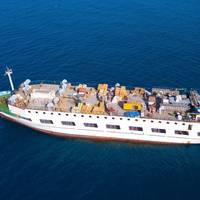
The company that operates Latin America’s largest port in the Brazilian city of Santos said on Friday it will suspend shipments of live animals. The company detailed its decision in a letter seen by Reuters that was sent by state-run Companhia Docas do Estado de São Paulo to a congressman. A press officer at Codesp, as the state-run operator is known, said the letter was authentic. Later, the company sent a statement confirming the suspension. The statement said that kind of operation…
Brazilian Grain Producers Explore Increased Use of Panama Canal
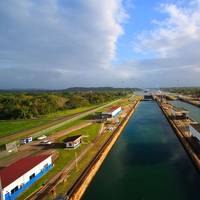
Brazilian farmers in top soy state Mato Grosso signed a memorandum of understanding with the Panama Canal Authority to evaluate ways to cut transportation costs and boost Brazilian grain volumes using the waterway, the authority's chief administrator said. The canal's administration is looking to increase its participation in rising Brazilian grain exports, since a large part of grain trade expansion in Brazil is via new terminals in the northern part of the country, which are closer to the canal.
Brazil O&G Output Tops Record in Sept
Brazil's oil and gas output reached a record 3.36 million barrels per day of oil equivalent in September, according to a report released by the government's petroleum industry regulator ANP on Friday. Oil production was 2.67 million bpd in September, 2.4 percent more than in August and 11.5 percent above the year-earlier output, ANP said. (Reporting by Marcelo Teixeira Editing by W Simon)
First Ship Loaded at Brazil's New Sugar Terminal
Brazil's new sugar terminal at the port of Suape in the state of Pernambuco will load its first ship on Friday, opening a new export corridor for mills in the Northeast at a time of strong demand for the sweetener. The Suape Sugar Terminal (TAS) was built by the Agrovia do Nordeste consortium, which is controlled by the logistic arm of Brazilian engineering conglomerate Odebrecht and by transportation firm Agrovia. (Reporting by Gustavo Bonato; Writing by Reese Ewing and Marcelo Teixeira)



